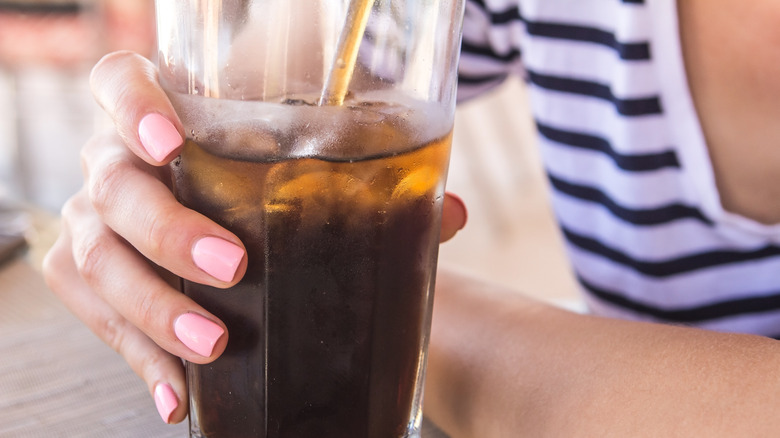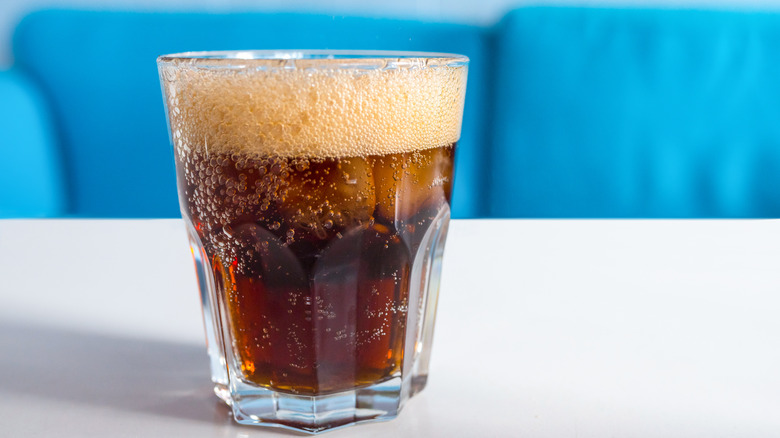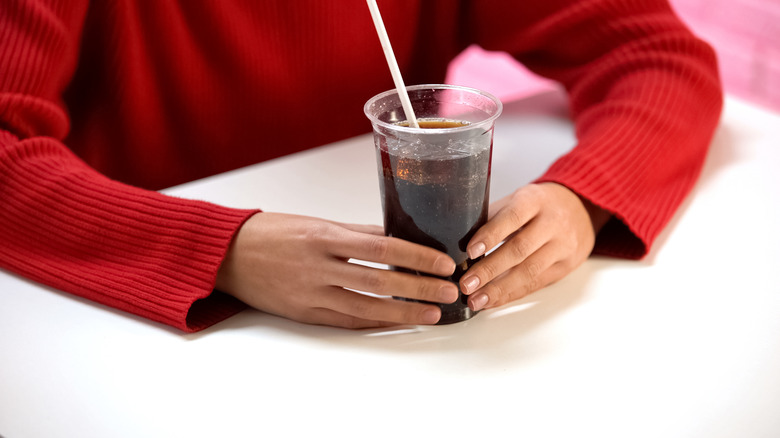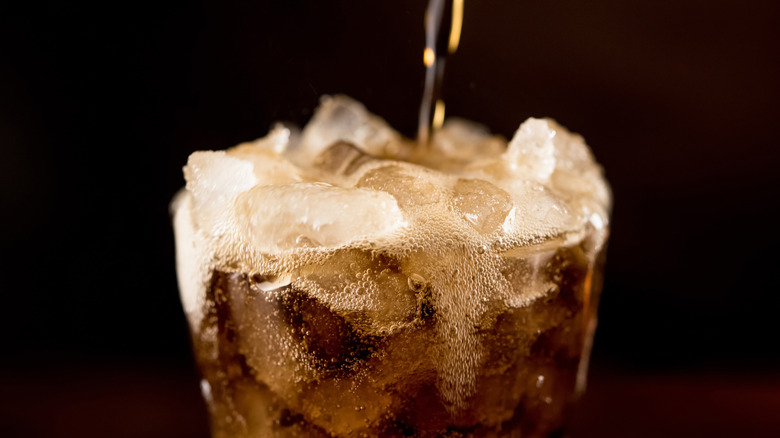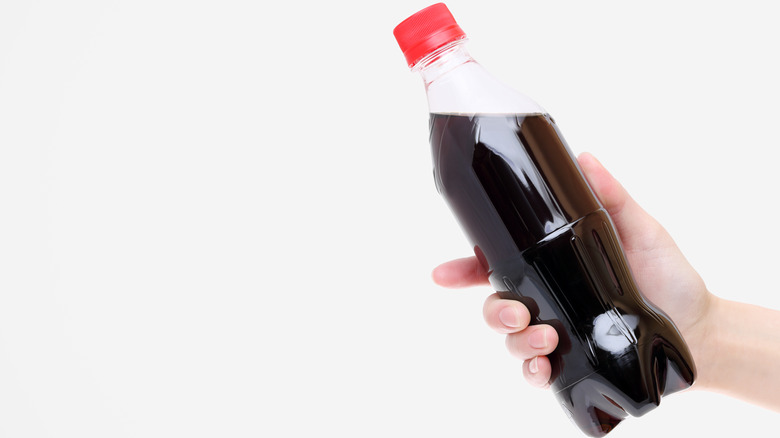What Drinking Too Much Soda Does To Your Body
If you drink too much soda, it could lead to a whole slew of issues. While fewer Americans may be drinking soda than in years past, half of all adults in the United States still pop open a can on a typical day. One Coke or Pepsi a day might not seem like much, but it's still more than double what the American Heart Association (AHA) recommends. According to the organization, men and women are advised to consume no more than 450 calories from these sugary drinks not per day, but per week. As CNN Health highlighted, that equates to about three cans of soda.
Through their "Sip Smarter" campaign, the AHA gives suggestions to help you cut back on soda and other sugary beverages, like switching over to seltzer or diluting your sugary drinks with sparkling water. "The best thing you can drink is water!" the AHA also exclaims. While we likely all know that to be true, is there really anything wrong with drinking one can of soda every day? We'll let the science do the talking. Here's what happens to your body when you drink too much soda.
You'll experience dental problems if you drink too much soda
It's bad for your teeth to drink too much soda, and it's not just because of the beverage's high sugar content. One study conducted in 2009 found that it is both the sugar and the acids found in soft drinks that contribute to "dental caries" — or tooth decay — and "enamel erosion."
The researchers discovered that slow, progressive tooth decay may "suddenly become rampant" when exposed to erosive acids. Unfortunately for soda drinkers, the most prevalent source of erosive acids is found in soft drinks. To prevent tooth decay, switching out soda for low-calorie and sugar-free foods and beverages were found to be beneficial. However, that doesn't mean diet sodas are fair game. According to the study, "sugar-free soft drinks often have as high erosive potential as sugar-containing soft drinks."
The researchers recommend choosing less erosive beverages, limiting your overall soda intake, and, interestingly, drinking your soda differently. By not letting soda linger in your mouth for too long before swallowing, you can decrease your risk of tooth decay and enamel erosion.
You'll become addicted if you drink too much soda
While you probably have zero interest in downing ten teaspoons of sugar right from the bag, the American Heart Association reports that a 12-ounce can of regular soda contains that many teaspoons of added sugar. In just a few minutes, you'll have consumed well over the recommended daily intake for an adult woman.
And while you may not think much of quenching your thirst with a Dr. Pepper, consuming that much sugar at one time actually affects the brain. According to Gina Sam, director of Mount Sinai Hospital's Gastrointestinal Motility Center (via Self), sugar is similar to cocaine in that it produces a rush of dopamine and serotonin when consumed. Both of these chemicals make you feel good, albeit temporarily.
"You then become addicted to that feeling, so every time you eat it you want to eat more," Sam explained to Self. Or, in this case, every time you drink it, you'll want to drink more. Before you know it, one soda a day could easily turn into two or three. So it's best to just avoid drinking too much soda altogether.
If you drink too much soda, you'll probably gain weight
If soda has gradually become your go-to drink, you may notice some weight gain over time. According to a study conducted by the Harvard T.H. Chan School of Public Health in partnership with Mexico's National Institute of Public Health (via Time), drinking too much soda spells weight gain.
Of the over 11,000 women surveyed in Mexico, those who reduced their regular soda consumption by about a can per week gained nearly one less pound than those who didn't drink any fewer sodas. Conversely, the women who added an additional can of soda to their diet each week gained over a half-pound more than those who didn't change their soda intake.
Over the course of the two-year study, drinking one additional can of soda per day also led to the participants developing a larger waist size and gaining an additional two pounds. "It is likely that changes in weight and waist circumference would be larger if the changes in sugar-sweetened soda consumption are sustained over time," the researchers concluded.
Your heartburn will get worse if you drink too much soda
Even if you don't drink too much soda all that often, you may turn to a bottle of cold, bubbly ginger ale to relieve a stomach ache. And that's because it works — or does it?
In an interview on Stat News' Boddities, Braden Kuo, a gastroenterologist at Massachusetts General Hospital, said it's "not necessarily the best thing for the stomach." The carbon dioxide, which makes soda bubbly, goes right into your stomach and can end up making you feel "more uncomfortable." The doctor continued, saying, "In addition, if you're drinking it cold, cold actually slows down the activity in the gut." It would actually be more helpful for your stomach if you drank "warm, flat ginger ale." Of course, that may sound gross even if you don't have an upset stomach.
If you have acid reflux, though, soda is going to exacerbate your symptoms. It's not just the carbonation, but also the acid, according to the book Dropping Acid: The Reflux Diet Cookbook & Cure by doctors Jamie Koufman and Jordan Stern. The medical professionals urge those with acid reflux to "please quit" drinking soda.
You'll experience energy crashes if you often drink too much soda
What goes up must come down, and that sugar high you get from drinking soda is going to come to an end. In response to drinking soda, your insulin spikes in an effort to regulate your blood sugar. Gina Sam, director of Mount Sinai Hospital's Gastrointestinal Motility Center, explained to Self, saying, "Once you eat glucose, your body releases insulin, a hormone from your pancreas."
After this process is over, your blood sugar drops once more. Even if, on the outside, all you've done is sit down at the movie theater and finish off a large soft drink, there was a lot happening internally. The spike, followed by the crash, is going to leave you zapped of energy. "That's the feeling you get when you've gone to the buffet and you've overdone it, and all you can do is lie on the couch," Kristen F. Gradney, Nutrition and Metabolic Services director at Our Lady of the Lake Regional Medical Center in Louisiana and spokesperson for the Academy of Nutrition and Dietetics, told the publication. Clearly, drinking too much soda is no good for your energy levels.
If you drink too much soda, you could develop type 2 diabetes no matter your weight
Drinking one soda or more a day has been found to increase a person's risk of developing type 2 diabetes by 26 percent, the American Diabetes Association revealed in 2010. A later study published in the British Medical Journal determined an 18 percent increased chance of developing type 2 diabetes if a person consumes one 12-ounce sweetened drink daily.
An increased risk exists regardless of a person's weight. Participants who were considered thin or of average weight but consumed one sugar-laden drink per day were found to have a 13 percent increased risk of developing type 2 diabetes. "So even if people are lean, if they continue consuming sugar-sweetened beverages, they have a greater likelihood of developing type 2 diabetes," Fumiaki Imamura, the study's author and nutritional epidemiologist at the University of Cambridge School of Clinical Medicine, explained to NPR. Drinking too much soda simply isn't worth the risk of diabetes.
You could become at risk for metabolic syndrome if you drink too much soda
It's not just drinking too much soda that increases a person's health risks. A study published in 2017 revealed that drinking diet soda was associated with a higher risk of end-stage renal, or kidney, disease. Furthermore, diet soda was also associated with "impaired glucose metabolism, diabetes, and metabolic syndrome."
The Mayo Clinic defines metabolic syndrome as a combination of conditions — mainly high blood pressure, high blood sugar, either abnormal levels of cholesterol or triglycerides, and increased body fat around the waist — that increase a person's risk of developing type 2 diabetes, stroke, and heart disease. Science has also found a link between metabolic syndrome and the later development of kidney disease.
Although it is estimated that a third of American adults have this syndrome, the Mayo Clinic advises "aggressive lifestyle changes" to "delay or even prevent the development of serious health problems." Some of these changes include exercising daily, following a healthy diet, and quitting smoking. As the 2017 research demonstrated, drinking fewer sodas — both diet and regular — is a worthwhile lifestyle change, too.
You'll feel tired and hungry almost constantly if you drink too much soda
After you've come down from your soda-induced sugar high, you're going to feel tired and hungry. "Your body's physiologic response is to send out enough insulin to deal with all the sugar and that can have a sluggish effect," Kristen F. Gradney, Nutrition and Metabolic Services director at Our Lady of the Lake Regional Medical Center and spokesperson for the Academy of Nutrition and Dietetics, explained to Self. "Additionally, if you are only eating simple sugars, you will feel hungry and tired because you are not getting enough of the other nutrients to sustain your energy."
If you're always feeling hungry and sleepy, drinking too much soda could be to blame. Despite having no caffeine, you might find that water energizes you more than that midday Coke. "Drinking enough water is imperative to boost and maintain energy," Jenna A. Werner, registered dietitian and founder of Happy Slim Healthy, explained to Reader's Digest. She noted, "Dehydration can slow down even your energy production which can cause you to feel tired and sluggish." And, naturally, water is a much better choice than soda when it comes to hydration.
Your body will age faster if you drink too much soda
If you drink too much soda, you may just be aging yourself on a cellular level, according to one 2014 study. According to the research, telomeres, the compound structure at the ends of chromosomes, were shorter in participants who drank more soda. Telomere length has previously been linked to our lifespans, and shorter telomeres have been associated with aging and the development of chronic diseases.
"Regular consumption of sugar-sweetened sodas might influence disease development, not only by straining the body's metabolic control of sugars, but also through accelerated cellular aging of tissues," Elissa Epel, professor of psychiatry at the University of California San Francisco and the lead author of the study, revealed in an interview. "This is the first demonstration that soda is associated with telomere shortness," Epel further explained. "This finding held regardless of age, race, income and education level." In the end, the researchers found that a daily 20-ounce soda equates to about 4.6 years of telomere shortening — which means it'll age you at about the same rate as smoking. Gulp.
You could quickly develop liver disease if you drink too much soda
If your body doesn't need energy at the time you decide to have a soda, your liver and muscles will store the extra glucose, Heather Mangieri, a spokesperson for the Academy of Nutrition and Dietetics and owner of the nutrition consulting company Nutrition Checkup in Pittsburgh, Penn., explained to Live Science. At any given time, though, your liver can only hold a finite amount of this glucose. If you flood your body with too much soda and thus more glucose than your liver can handle, the glucose has to find somewhere else to go, and that can be dangerous.
"If you exceed this amount [of glucose], it turns into fatty acids and that's when you get fat deposits in the liver," Gina Sam, director of Mount Sinai Hospital's Gastrointestinal Motility Center, revealed to Self. It can happen relatively quickly, too. "Fatty liver can develop within a five-year period," Kristen F. Gradney, Nutrition and Metabolic Services director at Our Lady of the Lake Regional Medical Center in Louisiana and spokesperson for the Academy of Nutrition and Dietetics, added.
You may notice a difference in your skin when you drink too much soda
You already know how detrimental soda can be for your body internally, but it can even have a negative effect on your skin. On the surface, a can of Coke may appear to having nothing to do with your skincare routine, but drinking soda may just be undoing all of your hard work and nullifying those spendy face creams.
"The collagen and elastin fibers in the skin are affected by a lot of sugar in the bloodstream," dermatologist Debra Jaliman explained to Self. One dermatological study revealed that once glucose attaches itself to proteins like collagen and elastin, it becomes much harder for them to repair themselves. Cue wrinkles and sagging skin. Of course, these things are just a normal part of the aging process, but drinking too much soda will speed up this process and cause you to look much older much faster. Thanks for that, soda.
If you drink too much soda, you could decrease your calcium levels
Sugar may be one of the worst things in soda, but that's not the only thing lurking in the can. Chances are your favorite soda contains phosphoric acid — a "colorless, odorless crystalline liquid," according to Healthline. It's used in sodas to prohibit mold and bacteria growth as well as give soda its tang. As its name implies, it's also responsible for soda's acidity.
Phosphoric acid isn't bad for you in and of itself. It's derived from phosphorus, a mineral that is naturally in your body. Phosphorus and calcium partner together to strengthen your bones, and phosphorus alone is vital for energy. However, the phrase "too much of a good thing" certainly applies here.
Just one can of soda may have 500 milligrams of phosphoric acid, leaving you with just under 30 percent of your recommended daily value remaining. If you drink too much soda in a day, and thus too much phosphoric acid, you run the risk of actually decreasing your calcium levels. When you have an unbalance of phosphorus and calcium, your bones aren't going to get stronger, but weaker.
Drinking too much soda could mean trouble for your bones
Research has shown a link between soda and osteoporosis, but it may not be just a case of too much phosphoric acid. "There is an association between people who have high soda intake and risk of fracture, but that's probably due to the fact that if they have a high soda intake, they have a low milk intake," Robert Heaney, professor of medicine at Creighton University in Omaha, Neb. and renowned expert on osteoporosis, told WebMD.
Bess Dawson-Hughes, professor of medicine and director of the Bone Metabolism Laboratory at the Jean Mayer USDA Human Nutrition Research Center on Aging at Tufts University in Massachusetts, agrees. "Individuals who drink a lot of soft drinks aren't going to drink as much nutritious liquid as others," she told the site. "We're simply not going to consume beyond a certain volume each day."
The researchers recommend cutting back your soda intake by a can or two per day. It may also be beneficial to drink milk or fortified orange juice as your replacement for drinking too much soda.
Could drinking too much soda lead to death?
Sure, drinking too much soda is bad for you, but it's not going to kill you — at least not any time soon, right? Although you may not have known it was possible, a shocking report in 2014 attracted national attention around the issue.
As Time reported that year, parents of a 5-year-old girl were charged with murder for forcing her to drink more than two liters of grape soda over a one- to two-hour time period. Her autopsy revealed "acute fluid intoxication" as the cause of death.
Robert Glatter, an emergency-medicine physician at New York's Lenox Hill Hospital, shared that any liquid — be it soda or water — consumed too quickly can be fatal. A person's kidneys can only handle so much water before the excess enters the blood cells. Soda can make matters worse because the carbonation creates even more fluid once the bubbles break down. When consuming too many fluids too quickly, the brain can swell and ultimately lead to death, Glatter added. Nevertheless, the physician said it would be very difficult to drink this much soda under normal circumstances. Listen to your body's cues, and stop drinking soda before you become uncomfortable.


